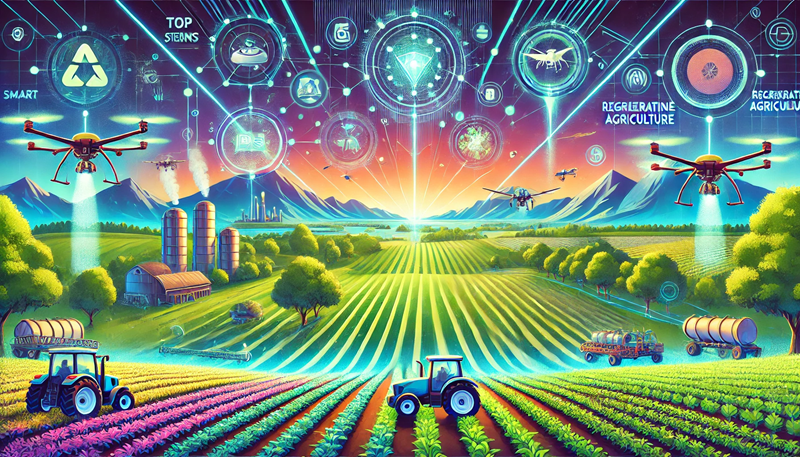Regenerative agriculture is becoming the cornerstone of sustainable farming practices, emphasizing soil health, biodiversity, and ecosystem balance. With the rise of agrotech innovations, farmers worldwide are adopting advanced solutions to revolutionize regenerative agriculture. In this blog, we’ll explore the top 5 agrotech trends that are reshaping the future of farming while promoting sustainability.
1. AI-Powered Precision Farming for Sustainable Crop Management
Precision farming using AI has emerged as a game-changer for regenerative agriculture. By leveraging artificial intelligence, farmers can:
- Analyze soil health and optimize nutrient usage.
- Monitor crop health with real-time data from drones and sensors.
- Predict weather patterns and adjust farming practices accordingly.
This technology ensures efficient resource utilization, reduces wastage, and promotes sustainable crop management practices.
2. Blockchain Technology for Transparent Agri-Supply Chains
Blockchain in agrotech is creating transparent and secure agricultural supply chains. By enabling traceability from farm to fork, blockchain ensures:
- Verification of organic and regenerative farming practices.
- Reduction of food fraud and supply chain inefficiencies.
- Better market access for small-scale farmers.
This trend is building trust among consumers and encouraging widespread adoption of regenerative methods.
3. Autonomous Farming Machinery for Soil Regeneration
Autonomous machinery, including self-driving tractors and robotic weeders, is transforming traditional farming. These innovations support regenerative agriculture by:
- Reducing soil compaction with lightweight machinery.
- Targeting weeds without disturbing soil layers.
- Automating cover crop planting to enhance soil health.
Such advancements enable farmers to prioritize soil regeneration while increasing productivity.
4. IoT-Enabled Smart Irrigation for Water Conservation
Water scarcity is a significant challenge in agriculture, making IoT-based smart irrigation systems a vital solution. These systems use sensors and data analytics to:
- Deliver precise amounts of water directly to plant roots.
- Minimize water wastage through advanced irrigation techniques.
- Adapt irrigation schedules based on real-time weather data.
Smart irrigation promotes water conservation, a critical aspect of regenerative agriculture.
5. Biotech Solutions for Enhancing Soil Health
Biotechnology in agriculture is advancing regenerative practices by developing bio-based solutions that improve soil fertility and crop resilience. Examples include:
- Biofertilizers that enrich soil microbiomes.
- Biopesticides that protect crops without harming beneficial organisms.
- Genetically modified crops designed for regenerative systems.
Biotech innovations are empowering farmers to restore degraded lands and boost productivity sustainably.
Why These Agrotech Trends Matter for Regenerative Agriculture
The integration of these agrotech innovations is essential for achieving the goals of regenerative agriculture. They address critical challenges like soil degradation, water scarcity, and climate change, ensuring long-term agricultural sustainability.
FAQs on Agrotech Trends in Regenerative Agriculture
1. What is regenerative agriculture, and why is it important?
Regenerative agriculture focuses on improving soil health, biodiversity, and ecosystem balance. It helps combat climate change, enhance food security, and promote sustainable farming.
2. How does blockchain benefit regenerative agriculture?
Blockchain ensures transparency in the supply chain, verifies organic farming practices, and connects farmers with ethical markets.
3. What role does IoT play in sustainable farming?
IoT-enabled systems optimize resource usage, monitor real-time farm conditions, and reduce waste, making agriculture more sustainable.
The top agrotech trends highlighted in this blog are paving the way for a sustainable and resilient future in agriculture. By adopting these technologies, farmers can enhance productivity, conserve resources, and restore the planet’s ecological balance. Regenerative agriculture, powered by agrotech, is the key to feeding the world while protecting the environment.
